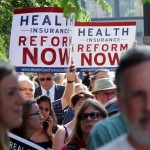Dems Hope Insurers Are More Unpopular than Obamacare
 To build support for Obamacare ahead of the midterms, Democrats are turning to a familiar strategy: targeting the health insurance industry.
To build support for Obamacare ahead of the midterms, Democrats are turning to a familiar strategy: targeting the health insurance industry.
House Democrats have named this week Consumer Protection Week, and emphasized healthcare and Obamacare, starting with a press conference by House Majority Whip Clyburn on Monday. The events are part of a larger strategy of gaining coverage for their issues during the August recess – obviously with November in mind. And as they aim to dominate the national debate, they are clearly hoping to build support for their landmark healthcare legislation.
How to do that? Democrats target the insurance industry, as they’ve done for more than a year now.
That may make for smart politics, but is it fair?
Back in August 2009, David Frum made an important observation about American healthcare:
Almost all the problems of the US health system trace back to a pair of unexpected ironies: profit-driven private insurance corporations find it much harder to say “no” than governments do, and American governments are more unsustainably generous than their European and Canadian counterparts.
The first point is particularly interesting.
Based on media reports, it would be easy to draw the opposite conclusion. Too often, the media portray greedy insurance executives putting profits before patients. A particularly winning line for Democrats in the last year was the following: you don’t really trust insurance companies, do you?
It’s striking that while much of Obamacare remains unpopular (as I noted last week, a majority doesn’t support the legislation), insurance regulations remain popular. Even conservative heartthrob Marco Rubio has emphasized in his calls for repeal that he would replace Obamacare with legislation that would regulate the insurance industry more carefully.
The president, of course, picked up on all this. In his speeches, town halls, and press conferences during the marathon that culminated in a White House signing ceremony this March, he mentioned often the stories of rescission – when insurance companies have literally cancelled coverage at the moment when patients needed it the most. The White House went so far as to create a web site so that people could post their health insurance nightmare stories.
Activists also were focused, as organizer Richard Kirsch explains in “What Progressives Did Right to Win Healthcare” published last week in The Nation:
Defining a corporate enemy: From the first ads we ran during the 2008 campaign, which had a female cancer survivor who linked Republican candidates to the health insurance industry, through the final ads we ran after the House passed the law, which thanked members of Congress for standing up to the army of 2,000 health insurance lobbyists, we had a clearly defined corporate target. Our tag-line was direct: “If the insurance companies win, we lose.” At the grassroots, we wrapped insurance company offices with yellow crime tape, with the words “It’s a crime to deny our care.” Two weeks before the bill passed, 5,000 activists staged a mass citizens arrest of health insurance company executives when they met at the Ritz-Carlton in Washington.
I wouldn’t attempt to defend the actions of some insurance companies. Stories out of California have been deeply unsettling, with juries sometimes finding for former patients. But these stories must be put in a larger context. Government-run health care is less compassionate.
Last September, I wrote an essay about insurance rescission on a national scale. I looked at British health care.
Under the guise of “comparative effectiveness research,” NICE makes decisions for the medical system. Instead of denying care patient by patient, they do it more broadly, using complex mathematical formulas to label entire treatments as unworthy. NICE doesn’t aim to better health care. Its mandate is to use formulas to justify health-care rationing.
Consider some recent NICE decisions.
August 7, 2008. British patients are outraged after NICE rejected the use of the drug Sutent to treat kidney cancer, despite evidence the drug could extend patients’ lives by years. The drug is available elsewhere in Europe. The Daily Mail reports: “[NICE] admits the drugs work, but says if they are approved, patients with other diseases will go without.” NICE reversed its decision in March 2009.
August 27, 2008. NICE surrendered, reversing a previous rejection of Lucentis, an anti-blindness treatment. With classic British understatement, the BBC says that NICE felt patients “should wait until they went blind in one eye” before coverage was justified. The Royal National Institute for the Blind bitterly attacks NICE for making patients wait two years for the reversal.
June 11, 2009. Doctors, patients, and drug manufacturers won a court appeal in 2008 after they demonstrated flaws in NICE’s comparative analysis of Aricept, an Alzheimer drug. NICE responds by changing its analysis formula – and then re-announcing the rejection.
July 9, 2009. NICE announced another change of heart. The government body rejected the drug Tyverb for coverage two months earlier, claiming the breast cancer drug cost too much for too little benefit. But NICE will now reconsider its decision based on a different perspective of effectiveness. Meanwhile, thousands of breast cancer patients are left in limbo.
Such decisions are too common in government-run healthcare systems.
Thus, while Democrats are busy attacking insurance companies, the reality is more complicated. Governments employ a form of rescission, too – and that’s a point that didn’t make it into the speaking points during Consumer Protection Week.